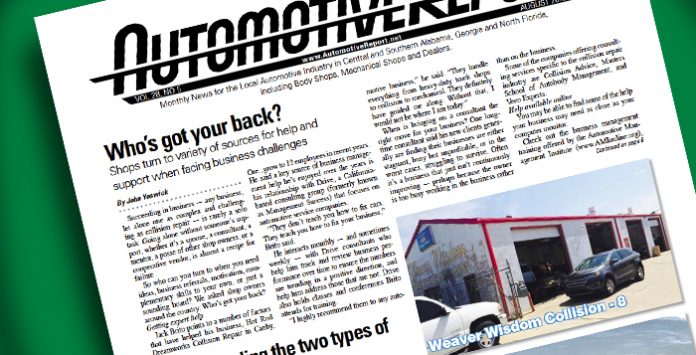Shops turn to variety of sources of help and support when facing business challenges
By John Yoswick
Succeeding in business — any business, let alone one as complex and challenging as collision repair — is rarely a solo task. Going alone without someone’s support, whether it’s a spouse, a consultant, a mentor, a posse of other shop owners, or a cooperative vendor, is almost a recipe for failure.
So who can you turn to when you need ideas, business referrals, motivation, complementary skills to your own, or just a sounding board? We asked shop owners around the country: Who’s got your back?
Getting expert help
Jack Brito points to a number of factors that have helped his business, Hot Rod Dreamworks Collision Repair in Canby, Ore., grow to 12 employees in recent years. He said a key source of business management help he’s enjoyed over the years is his relationship with Drive, a California-based consulting group (formerly known as Management Success) that focuses on automotive service companies.
“They don’t teach you how to fix cars. They teach you how to fix your business,” Brito said.
He interacts monthly — and sometimes weekly — with Drive consultants who help him track and review business performance over time to ensure the numbers are trending in a positive direction, and help him address those that are not. Drive also holds classes and conferences Brito attends for training.
“I highly recommend them to any automotive business,” he said. “They handle everything from heavy-duty truck shops to collision to mechanical. They definitely have guided me along. Without that, I would not be where I am today.”
When is bringing on a consultant the right move for your business? One long-time consultant said his new clients generally are finding their businesses are either stagnant, busy but unprofitable, or in the worst cases, struggling to survive. Often it’s a business that just isn’t continuously improving — perhaps because the owner is too busy working in the business rather than on the business.
Some of the companies offering consulting services specific to the collision repair industry are Collision Advice, Masters School of Autobody Management, and Veco Experts.
Help available online
You may be able to find some of the help your business may need as close as your computer monitor.
Check out the business management training offered by the Automotive Management Institute (www.AMIonline.org), a non-profit organizations (created by the Automotive Service Association) that offers online and classroom business management training and credentials.
If you have question about improving the accuracy and completeness of your estimates and repair orders, check out the Database Enhancement Gateway (www.DEGweb.org), where you can challenge the accuracy of estimating databases. The “Who Pays for What?” surveys (www.crashnetwork.com/collisionadvice) offer detailed findings on what “not-included” labor operations shops report regularly being paid for.
There are also several Facebook groups focused specifically on the industry. “Collision Repair Technicians United” has more than 22,000 followers on Facebook, and “Auto Body Repair (professionals only)” has more than 28,000.
For technical information, I-CAR is often a great resource. The “Ask I-CAR” feature on the training organization’s “Repairability Technical Support Portal” (https://rts.i-car.com/), for example, allows users to email or call I-CAR with a technical question for which they haven’t been able to find an answer. All the questions and responses are posted in a searchable (by year-make-model) database on the site. If the procedure you ask about is not available, I-CAR will attempt to get information from the automaker. If the procedure is available but only through the fee-based website operated by the automaker, I-CAR will refer you to that site.
Another source of free information, ideas and help: The publication you are reading this article in. If you don’t find what you’re looking for in this issue, head to Automotive Report’s website (www.automotivereport.net) for a searchable database of back issues.
Joining a 20 group
Kevin Morse of Elite Collision Center in Battle Ground, Wash., said in the last couple of years he made two fundamental decisions about his business: He ended all the shop’s direct repair program agreements with insurers and joined an Axalta-sponsored “business council,” or what is generically called a 20 group. A 20 group brings together similar-sized collision repair businesses from different markets to compare financial and business performance, share ideas, and motivate one another to improve. Morse’s group is led by industry trainer and consultant Mike Anderson.
“We meet four times a year, all over the United States, and it’s pretty intense,” Morse said. “Man, I thought I knew my stuff and was running a pretty good operation. But surrounding yourself with the most progressive shops out there can be eye-opening in terms of what you can improve. It’s been so fun to meet people who are excited about this industry, and have the same sort of thought mentality that I do.”
A shop tour and discussion at one of the council’s meeting, for example, convinced Morse of the benefits of using a dustless sanding vacuum system. He’d had such a system installed in the shop some time ago, but hadn’t been using it.
“I came back and bought the entire shop the tools they needed to use it,” Morse said. “The guys didn’t have to purchase anything. We showed them the benefit of using it, and we’re keeping the shop a lot cleaner.”
To locate a 20 group, start with your paint company or jobber, or contact one of the independent 20 group facilitators, such as the Coyote Vision Group or QLC Inc.
Going outside the industry
Sometimes the help you need can come from outside the industry. Joining a local chamber of commerce can give you access to other business owners in your market who may have overcome some of the business challenges your company may be facing. It can also be a way to develop a network of referral sources from fellow business owners in your community. Consumers, too, sometimes turn to their local chamber when they are looking for a specific service in town.
Though not specific to this industry, the non-profit Senior Corps of Retired Executives (SCORE) provides free online consulting (www.score.org) from a volunteer corps of working and retired business owners on all aspects of business management; SCORE also offers free in-person counseling at 390 locations nationwide.
Business networking groups can be another source of customer referrals. Most such groups meet regularly, allowing no more than one provider of a particular product or service into the group. As the one collision repairer in a group, you will have an opportunity to speak about your business, share your expertise, and possibly host a meeting at your shop. As you learn about the other businesses in the group, you will be expected to make an effort to refer others to businesses in the group — just as those other members will recommend your shop to those they encounter. To locate a networking group in your market, LeTip (https://letip.com) and Business Network International (www.bni.com) are among the largest networks, although many markets have locally-organized groups as well.
Ask those you do business with
Often a great source of business help and support is the company that is regularly dropping off paint and supplies at your shop: your jobber. They can share the expertise they’ve gained from seeing the inner workings of other shops, and are a great link to the value-added services that may be available from the paint manufacturers.
Mark Martin of Ankeny Autobody1 in Ankeny, Iowa, said his jobber helped him develop a bonus program for his paint department based on efficient materials usage.
“I don’t know if I’d ever gotten that done without their assistance,” Martin said.
His jobber is himself a small business owner, so has faced many of the same types of business challenge, Martin said.
“They’re a great business resource to talk about where you’re going and how to get there, and to get their input on how they can help you,” he said.
Turning to a trade association
Show up at a trade association class or meeting, and you’ll likely be sitting next to someone — a fellow shop owner — who might be able to offer you just the help you need. Belonging to an association ensures you always have someone to call when you’re facing a business challenge; depending on the issue, the association might not be able to help you directly, but can be a great clearinghouse to locate the help you need.
There are state or regional associations in many markets. You can locate one by starting with the two largest national associations — the Automotive Service Association (ASA) and the Society of Collision Repair Specialists (SCRS) — and checking for their affiliated state groups.
ASA and SCRS also offer tools, videos and other sources of help right on their websites. ASA, for example, regularly updates what it calls “Not-Included Operations” charts. The free publications are designed to ensure collision repairers consider all of the possible operations when they write an estimate calling for the installation of new or used parts. The documents are included on the “Free Industry Tools and Resources” section of the ASA website (http://asashop.org/tools-resources/free-industry-tools/).
SCRS also offers estimating help with its free “Guide to Complete Repair Planning,” a 24-page handbook to assist shops generate “the most accurate repair plan…to minimize the need or expense of a supplement.” It can be downloaded at no charge at www.scrs.com.
But help make sure the national or local associations have the resources they need by ponying up the dues for a membership in one or more groups. The more the industry joins together, they better able these associations will be to continue to “have your back.” •
John Yoswick, a freelance writer based in Portland, Ore., who has been writing about the automotive industry since 1988, is also the editor of the weekly CRASH Network bulletin (www.CrashNetwork.com). He can be contacted by email at john@CrashNetwork.com.



